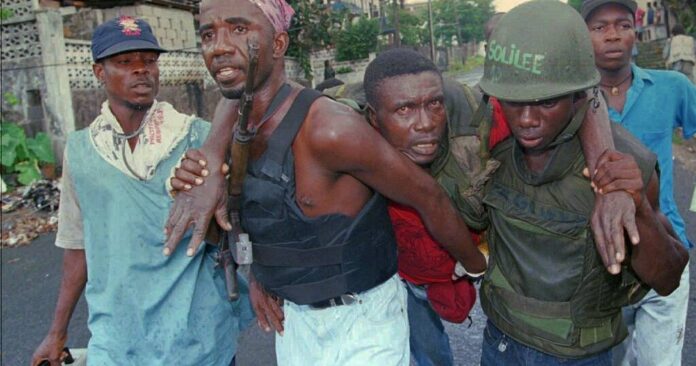by Kemo Cham
A courtroom sketch showing Kunti Kamara addressing the Paris Criminal Court during his trial, October 2022. ©️ 2022 Civitas Maxima / JP Kalonji
Human rights campaigners have hailed the conviction of a former Liberian rebel commander as a milestone, noting that it raises hope for justice for victims of the country’s civil war.
Kunti Kamara, also known as Kunti K., or CO Kunti, was convicted for war crimes and sentenced to life imprisonment by a French court.
The verdict, which was announced on Wednesday, brought to an end about four weeks of trial that was preceded by a two-year investigation.
The rights groups Amnesty International France, International Federation for Human Rights (FIDH), and Human Rights Watch in a joint statement said it represented hope for justice for victims of the Liberian war and called on the authorities to reconsider their position on calls for the establishment of a court to try suspected perpetrators of war crimes.
Kamara was a member of the United Liberation Movement of Liberia for Democracy (ULIMO), one of five main warring sides in the 12-year long Liberian civil war (1989 – 2003). ULIMO, which later disintegrated into two factions – ULIMO K and ULIMO J – was mostly active during the first part of the war. – 1989 to 1997.
He was found guilty of complicity in crimes against humanity, and responsibility as a direct perpetrator for torture and “barbaric acts”, according to the Paris Criminal Court which heard the case.
ULIMO is accused of perpetrating killings, rape, beatings, forced labor, and torture of its victims. Witnesses and some victims reportedly identified Kamara as one of those who physically took part in the commission of those crimes. The 47-year-old committed the crimes between 1993 and 1994, according to prosecutors.
Witnesses narrated graphic details of his crimes, including the killing of a whistle-blower with an axe and eating his heart. His group also kept young women as sex slaves, the court heard.
Since the end of the Liberian civil war, rights groups have been trying to bring to justice people considered as having committed the greatest crimes, amid reluctance by successive governments to do so.
Witness testifies in front of the judges of the Paris Criminal Court at the Kunti Kamara trial in Paris, October 2022 ©️ 2022 Civitas Maxima / JP Kalonji
More than 250, 000 people were killed and nearly a million displaced by the end of the war, according to reports.
A truth and reconciliation commission set up in 2006 to probe crimes committed during the war published its reports in 2009, and its recommendations remained largely unimplemented. Both former President Ellen Johnson Sirleaf and current President George Weah cited the need for prioritization of peace over justice.
Consequently, many warlords identified for their role in the commission of war crimes have gone on to transform themselves into some sort of heroes. Some, like Prince Johnson, are in politics, holding prominent public offices. Johnson, who became notorious for the killing of the deposed former Liberian President Sameul Doe, is a senior Senator in the Liberian Legislature. He is also a Pastor.
“More than 25 years later, the French court’s verdict is a ray of hope that justice is possible for the victims in Liberia,” said Elise Keppler, Associate International Justice Director of Human Rights Watch.
“The Liberian government should stop dragging its feet and request the UN, US, African Union, and other international partners to assist in setting up a war crimes court so more people implicated in crimes during the civil war can be held to account.”
Kamara was first detained in 2018, after the rights campaign group Civitas Maxima took up his case with French authorities. The subsequent investigations included a two-week fact-finding mission in the northwestern Lofa County of Liberia, where his faction was reportedly based.
The trial by France was possible because of a 2012 law which recognizes certain serious crimes under international law.
The universal jurisdiction law allows for the prosecution of such crimes regardless of where they are committed or the nationality of the suspects or victims.
The Kamara trial is also said to be the first under the law after cases related go the Rwandan genocide.
Kamara is also one of few persons who have been tried for war crimes in connection to the Liberian civil wars. Ex-rebel commander, Alieu Kosiah, was convicted in Switzerland in 2021 for his role in the Liberian war. Kosiah, also a former ULIMO leader who is serving 20 years for war crimes, was among witnesses who testified in the trial of Kamara.
In Finland, ex-Sierra Leonean rebel commander, Gibril Massaquoi, was acquitted in April over alleged crimes in the second Liberian war. He was a member of the Sierra Leonean rebel group, the Revolutionary United Front, which fought alongside ULIMO in the Liberian war.
Charles Taylor Jnr, a son of former Liberian President Charles Taylor, was convicted in the United States for torture in 2008.
And in 2018, US authorities also jailed former ULIMO warlord Mohammed Jabateh for 30 years on immigration fraud charges.
The former President himself is serving a 50-year jail term for his role in the war in neighboring Sierra Leone. The Sierra Leonean war was a spillover from Liberia, which Taylor triggered.
Unlike Liberia, Sierra Leone, with the backing of the United Nations, conducted a trial for war crimes targeting those who bore the greatest responsibility.
“This trial on atrocities in Liberia is an important example of how France’s universal jurisdiction can offer a path for justice to victims,” said Jeanne Sulzer, head of the International Justice Commission at Amnesty International France. “Witnesses described extraordinary brutality for which Kunti Kamara was found guilty, including killings, rape, and torture.”





































